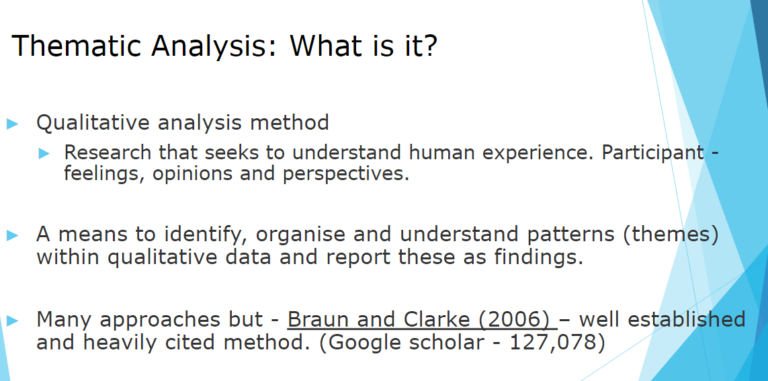What is Thematic Analysis?
Dr Douglas Eacersall, an expert and learning advisor in research education, says that thematic analysis is one of the easier and straightforward research methods to use.Thematic analysis is commonly used for qualitative research or studies that seek to understand human experience. Furthermore, it is a means to identify, organize, and understand themes across qualitative data and report these as findings. There are various analytical methods and approaches to use, however, Dr. Eacersall primarily focused on Braun and Clarke’s (2006) well-established and heavily-cited methods.

Organizing Qualitative Data: Why Use Thematic Analysis
Thematic analysis is arguably the best approach to use in many situations because it is highly flexible. Dr. Eacersall elaborated that this particular analytical method can be used to work with almost all qualitative data and is also compatible with all types of research questions. It can also work across different theoretical approaches – such as either deductive approach (there is an established theory or hypothesis to be tested) or inductive approach (developing a theory from the data). Another benefit from using thematic analysis is that it can provide the research project a step-by-step process to follow. Further, it helps the researchers step through the methods while realizing that the process is not as linear as it appears to be.
Braun & Clarke’s Six Steps to Success in Thematic Analysis
Familiarize yourself with your data
Conduct interviews (have high quality recordings of these)
Transcribe the data and start jotting down initial ideas.
Generate initial codes
A code is a label for interesting ideas within the data. It should be flexible and may change the more you reflect on the data.
Inductive coding is letting the codes emerge during the process whereas deductive coding is making use of predetermined codes.
A project typically ends up with 100 or more codes to capture interesting points from the data.
Coding tools: Microsoft Word, Excel spreadsheet, coding software such as NVivo and ATLAS.ti
Generate themes
Collate codes into potential themes. Think of themes as supporting points for a larger argument.
Use thematic maps/tables/mind maps.
Review themes
Rethink the themes and the research questions
Regroup and/or restructure the codes.
Define and name themes
Refine the specifics of each theme. Generate clear definitions and names for each theme.
Think about the organization of the themes. Does it reflect the story you are trying to tell?
Produce final report/write up
Select vivid and relevant data extracts from your coding to support each theme.
Link the analysis to the research question/s and the wider literature.
While the approach does appear linear since it is systematic, the professor pointed out that the thematic approach must be worked out in a recursive and reflexive process. It is recursive; researchers still have to return to earlier steps and rethink or restructure the codes and themes. It is also reflexive; researchers must perform critical self-reflection wherein they question each finding that comes out from the data. Lastly, it is important to recognize that the process itself has a messy, creative, and interpretative nature of qualitative research.
Helpful Links and Resources:
Virginia Braun & Victoria Clarke (2006) Using thematic analysis in psychology, Qualitative Research in Psychology, 3:2, 77-101, DOI: 10.1191/1478088706qp063oa
YouTube video: Braun and Clarke – Introduction to Thematic Analysis
YouTube channel: Research with Dr. Kriukow
To conclude his talk, Dr. Eacersall presented how he thematically structures the codes and themes for his scholarly research paper using Microsoft Word. Each theme is highlighted, followed by corresponding sub-arguments and interesting points from the data. He reiterated that the actual data behind the organized analysis is tremendously convoluted. Hence, thematic analysis is beneficial to structuring these data.
Written by: Jen Javier
